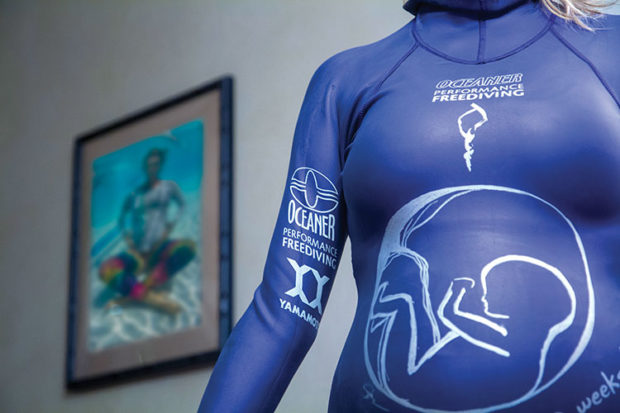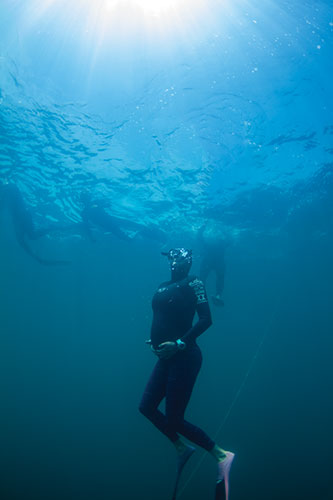Freediving Pregnant: One freediver’s story
By Kirk Krack & Ashley Futral Chapman

There is little conclusive evidence supporting mainstream advice that women should stop diving (with compressed air) during pregnancy. The lack of science backing up the counsel is partly due to the fact that experimenting on pregnant women is unethical. That and endless observation on rats, believe it or not, still only estimates the effects on a real human woman and her unborn child. If you think data is sorely lacking in regards to pregnancy in scuba diving, try researching the same for a fringe sport like freediving. And even better, if you want to fast track your chances of being black-balled from Sunday dinner, mention your intentions to continue freediving, regardless of deficient scientific information, with your parent’s first grandchild along for the ride. That conversation with the family went about as well as you are imagining right now.
Pregnancy
When I found out I was pregnant with our first child, Ani, my husband, Ren, and I were in the Bahamas training for another freediving world record. We had lofty ambitions as do those unencumbered by family, jobs, and the need for more money. The world was our proverbial oyster and we intended to crack that baby wide open. Speaking of babies, little did we know Ani was right around the corner. As soon as the stick turned pink I made a call to the only person I knew who freedived throughout her pregnancy. My friend and freediving mentor, Mandy-Rae Krack instantly assured me that everything was going to be OK. She continued to teach freediving throughout her pregnancy with daughter, Kaila. She also assured me that my training days were over until after the birth.
These people, like me and the rest of the world, knew absolutely nothing about the effects of freediving pregnant.
Right, wrong, but never indifferent, I treated myself as the test rodent (and, as uncomfortable as this is to admit, Ani as well). During this experimentation period the only armour I had was a set of hypotheticals that Mandy and husband, Kirk Krack, had devised based on their knowledge of dive physiology and their own freediving experiences. The underlining hypotheses were: the baby is encompassed in fluid. Since fluid is incompressible the baby should not suffer barotrauma.
As long as the dives aren’t resulting in overt hypoxia in the mother, the baby should be fine.
It is words like “should be” that resulted in the aforementioned Sunday dinner black-balling. Looking back, writing this now, I can’t say that I blame my family for their apprehension! With the above listed items as ammunition I decided to abandon my training depths and stick to depths that were easy for me. In the Intermediate level freediving course we, as instructors, routinely dive to 130 feet (40m). I ascertained that 130 feet (40m) was a good starting point, as I had no intentions of quitting work during my first trimester. Dives to 130 feet (40m) felt fine. I learned later that fetal hemoglobin has a higher affinity for oxygen than maternal hemoglobin which means the fetus (Ani) would be better oxygenated than I would be. This would also allow easier transfer of oxygen from maternal hemoglobin to fetal hemoglobin. In short, Ani would have more available oxygen than me at any given time and she would suck whatever she need from me easily. When I surfaced nice and clean, feeling great, after these 130 foot (40m) dives I surmised that Ani was definitely fine.

Data acquisition
The second trimester was a bit more challenging. In lieu of competing in the Caribbean Cup freediving competition in Roatan, Honduras, I signed on to work under Ren as a safety diver. Again, this decision was met with mixed sentiments. This time, resistance came from the freediving community itself. When experienced freedivers and judges expressed their concern for me making the required 100 foot (30m) dives to be a competent and able safety diver I would be remiss if I did not admit that I had second thoughts. This coming from people that have been in the sport longer than me, knowing more than me, from people I respect. However, there was one piece of common ground between myself and my counsel. These people, like me and the rest of the world, knew absolutely nothing about the effects of freediving pregnant. Ren, fellow diver Maria-Teresa Solomons, and I decided the only course of action was to take some data, to try to come up with solid information either condemning or supporting the decision to safety dive. Through the process, we ended up convincing everyone else that we weren’t injudicious in our decision to dive.
We set up a systematic series of dives to be completed by the three of us. The methodology would be to compare oxygen saturation levels upon surfacing from three distinct types of freedives by three distinct types of freedivers: myself (pregnant female), Maria-Teresa (non-pregnant female), and Ren (male). The evidence overwhelmingly suggested that my oxygen levels were just fine – each dive well within normal range and my recovery coming even quicker than Ren’s in some dives. These results were despite the fact that my hematocrit levels were essentially diluted at the time due to the increased blood volume caused by pregnancy. Needless to say I safetied throughout the competition without complications.
Shallowing up
During my pregnancy there were times I decided to reduce freediving depth, all in relation to discomfort. Basically the bigger I got, the harder it was to put on a wetsuit, reach my feet to don fins, and comfortably tolerate the boat ride out to the dive site. Not to mention take a deep breath before the dive with a growing child pushing against every organ in my body (or so it felt). As the pregnancy progressed I didn’t have to make a conscious decision to “shallow up”. My body made the decisions for me through this discomfort. Another interesting thing happened as Ani came closer and closer to her grand entrance into the world. Psychologically the dives became much more challenging. I stopped having fun towards the end, as my thoughts were consumed with the life inside of me. The life that, at that point, had started moving and communicating with us. The worry for her safety began to overwhelm me. I started to feel like a bad mother and she wasn’t even born yet. Maternal guilt starts early and it ended my freediving for that season.
Around the seven or eight month mark I traded my fins in for flip flops and rested, assured that my freediving life didn’t have to stop just because I was pregnant or just because we were growing a family. I recovered nicely from my pregnancy with Ani. (Enough to set a few more national records.) I have also gone on to freedive through a second pregnancy with our son, Cape. I would never recommend taking up freediving as an expectant mother but for those who are already diving regularly I say have fun but heed the advice of your body. It will tell you when enough is enough. More importantly, trust what your newly minted mother’s intuition is telling you. If you’re nervous, scared, or uncomfortable, don’t do it. It’s just that easy. The summer before Ani was born I happily cooled my swelling feet in the ocean, watching Ren dive, sipping some non-alcoholic beverage (I’m not crazy!) waiting for my turn to get back in the mix.
Ashley Futral Chapman operates Evolve Freediving and is 3 time world record holder, 14 time national record holder.







